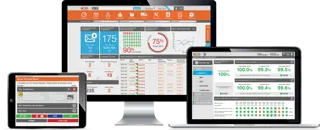The All-Party Parliamentary Group (APPG) on Road Freight and Logistics is calling for an essential user rebate on fuel duty, which would cut the effective level of fuel duty to that of Germany.
In a report, launched by the chair of the APPG, former roads minister Sir Mike Penning MP, it suggests the rebate would provide a reduction in fuel duty of around 15 pence per litre for road haulage operators.
The report says that UK hauliers are subject to a ‘fuel duty penalty’ with the average fuel duty (diesel) for all EU countries is 39.99 pence per litre (ppl) compared to the UK’s 57.95ppl, with eight EU member states (France, Italy, Spain, Romania, Spain, Belgium, Hungary, and the Republic of Ireland) providing fuel duty rebates to hauliers.
As a part of their inquiry, the group conducted a survey of hauliers presenting four scenarios available to the Chancellor, an increase, a freeze, a cut or a rebate for essential users.
The survey showed that 92% of all respondents to the APPG’s inquiry indicated that an increase of 2p per litre would have a negative or very negative impact on their business, and more than half (57%) believe a freeze would have a positive or very positive impact on their business.
Furthermore, the report found that 93% believed that a fuel duty cut would have a positive or very positive impact on their business and 92% believed that there would be significant advantages to the introduction of an essential user rebate for hauliers.
Given the challenges and financial pressures facing the Chancellor, Rishi Sunak, in today’s Budget, the group have put to one side a cut or freeze in overall fuel duty and have recommended that the Chancellor introduce an ‘essential user rebate ’in order to support the haulage industry and remove some of the financial pressure on an industry damaged by the impacts of the pandemic.
Penning said: “It will be impossible for our economy to recover without a road freight and logistics sector that is fighting fit.
“The Chancellor must ensure that the Budget supports and protects this vital industry which has been so badly hit by the impacts of the pandemic.”
Penning believes that for far too long hauliers have been hit with the highest rate of fuel duty in Europe. “The Chancellor can send a powerful statement about the value of the industry by ending this fuel duty penalty through the introduction of an essential user rebate bringing us in line with our European neighbours,” he said.
USE BREXIT FREEDOMS
No longer bound by EU state aid rules, Chancellor Rishi Sunak must use the Government’s Brexit freedoms to make fiscal changes that will support businesses in the hard-hit transport and logistics sector on the road to recovery and protect jobs, according to accountancy firm, Menzies LLP.
It says that the Chancellor should be using his first post-Brexit Budget to establish a tax regime that incentivises innovation and capital investment, while helping to position the UK as a place that companies in the sector will want to stay, invest and grow.
Andrew Galliers, audit director at accountancy firm, Menzies LLP, said: “Now is definitely not the time to increase corporate taxes or reduce incentives for innovation and capital investment, as this will do nothing to help struggling transport operators to repair their business models and prepare for a post-pandemic bounce back. There will be a time to recoup some of the cost of the pandemic but promoting stability must come first.”
The Chancellor could for example change current corporate tax loss relief rules to allow losses incurred in the pandemic to be carried back for a longer period, in a similar way to companies being able to reclaim tax in the 2008 recession, says Menzies.
Alternatively, he could be more creative still and allow loss-making businesses to offset losses against last year’s PAYE liability.
“Such changes would allow some of the hardest-hit businesses to access a tax refund to support them on the road to recovery,” explained Galliers.
The Government has already agreed to extend the £1 million Annual Investment Allowance limit to January 1, 2022, which will be helpful for businesses incurring capital expenditure.
However, they could go further by increasing the limit or broadening the scope of capital expenditure that might qualify, to include more structural costs, it says.
“This Budget is the Chancellor’s first opportunity to assert the UK’s independence from the EU,” said Galliers. “Enhancing tax reliefs in a way that would target support for struggling businesses could deliver a much-needed economic boost and protect jobs.
“Specifically, help is needed to address the skills shortage in the sector and with unemployment rising, tax incentives could be introduced to provide opportunities for people who want to re-train.
“As well as providing more HGV drivers, incentives in this area could encourage more people to train as customs clearance specialists and warehouse operatives.”
He concluded: “We appreciate the significant pressures that the Chancellor is under on many fronts and whilst a fuel duty cut for all may not be possible, a rebate for the industry that drives Britain forward will bring many of the benefits of a cut, but at a fraction of the cost.
“As we look towards our recovery, we urge the Chancellor to accept that holding back haulage risks holding back our economic recovery. We need to reform to fuel duty to boost our road freight and logistics sector.”






















Login to comment
Comments
No comments have been made yet.